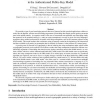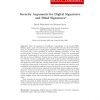123 search results - page 17 / 25 » Modelling the relative strength of security protocols |
CORR
2006
Springer
13 years 7 months ago
2006
Springer
We consider a type of zero-knowledge protocols that are of interest for their practical applications within networks like the Internet: efficient zero-knowledge arguments of knowl...
CORR
2008
Springer
13 years 7 months ago
2008
Springer
Getting agents in the Internet, and in networks in general, to invest in and deploy security features and protocols is a challenge, in particular because of economic reasons arisi...
ATVA
2009
Springer
14 years 1 months ago
2009
Springer
We present a data symmetry reduction approach for model temporal-epistemic logic. The technique abstracts the epistemic indistinguishably relation for the knowledge operators, and ...
JOC
2000
13 years 7 months ago
2000
Abstract. Since the appearance of public-key cryptography in the seminal DiffieHellman paper, many new schemes have been proposed and many have been broken. Thus, the simple fact t...
IMC
2006
ACM
14 years 1 months ago
2006
ACM
Network managers are inevitably called upon to associate network traffic with particular applications. Indeed, this operation is critical for a wide range of management functions...


